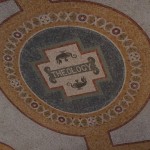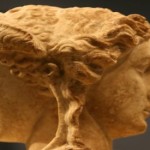We run our website the way we wished the whole internet worked: we provide high quality original content with no ads. We are funded solely by your direct support. Please consider supporting this project.
How NOT to be Christ-Centered: A Review of God With Us – Part II
In Part I of my review of Scott Oliphint’s God With Us we saw that Oliphint is attempting to reframe divine accommodation in a Christ-centerd way. Yet, while he affirms that “Christ is the quintessential revelation of God,” he went on to espouse a classical view of God that was anchored in God’s “aseity,” not Christ. What then does Oliphint mean when he says he wants to construct a Christ-centered understanding of accommodation?
Once he fleshes out his classical understanding of God, we discover that what Oliphint means when he says his approach will be Christ-centered is that he wants to use the “hypostatic union” (referring to the union of God and humanity in Christ) that was articulated at the Council of Chalcedon (454AD) as the paradigm for understanding divine accommodation (see esp. 139-56). In this light, I think it’s fair to describe Oliphint’s project as being not so much centered on Christ as it is centered on the Council of Chalcedon – indeed, centered on a particular interpretation of Chalcedon, as we’ll see below. As Oliphint interprets it, the “hypostatic union” worked out in this council involved God – the immutable and impassible God he has just fleshed out – becoming a full human without thereby surrendering any of his essential divine attributes. “God did not (indeed, could not) give up any essential aspect of his deity in order to assume human nature,” he avers (151).
One of the strategies Oliphint employs to render this hypostatic union coherent is a “reduplicative strategy” that involves a type of reasoning that proceeds along the lines of “X as A is N” (151-54). As a full human, Jesus possessed all the attributes of a human, while as God, Jesus possessed all the attributes of God. As a full human, for example, Jesus was ignorant of certain things, while as God Jesus was omniscient ( 154). Consequently, he later notes, “what we have in the person of Christ is a mysterious unity, a unity in which there can be real ignorance together with exhaustive knowledge” (178). So too, as a full human, Jesus was limited in space, while as God, Jesus was omnipresent. All of this is simply a way of articulating the Chalcedonian Creed that in Christ, “we have the perfect union of God and creation in the uniting of the two natures in one person.” Hence, Oliphint concludes, “if we want to know how God can relate to his creation, we should look to the example of that relationship in the person of Christ” (156).
In Part III of this review we’ll see that Oliphent is going to use the Chalcedonian creed as the framework for understanding all of God’s accommodations in Scripture, and it produces some very interesting results – and problems!
Category: Essays
Tags: Book Reviews, Classical Theism, Cruciform Theology, Essay, God With Us
Topics: Biblical Interpretation
Related Reading

The Ultimate Criteria for Theology
Theology is thinking (logos) about God (theos). It is a good and necessary discipline, but only so long as it is centered on Christ. All of our speculation and debate about such things as God’s character, power, and glory must be done with our focus on Jesus Christ—more specifically, on the decisive act by which…

Caught Between Two Conflicting Truths
In my previous blog I tried to show that adopting a “Christocentric” approach to Scripture isn’t adequate, as evidenced by the fact that people adopting this approach often come to radically different conclusions. In fact, it seems to me that the “Christocentric” label is often close to meaningless inasmuch as it doesn’t meaningfully contrast with anything. If a “Christocentric”…

The Phinehas vs. Jesus Conundrum
I’ll be frank. This is not a blog that will be easy for some people to read. But it’s a blog I believe every follower of Jesus should read – even if you have to force yourself to press on. It’s about something we all wish was not true. It’s about the way the Bible…

The Entire Old Testament is About Jesus
Jesus himself taught that he carried more authority than any prophet that predated him. Though Jesus regarded John as the greatest prophet up to himself (Matt 11:11), he claimed his own “testimony” was “weightier (megas) than that of John” (Jn. 5:36). Jesus certainly wasn’t denying John or any previous true prophet was divinely inspired. But…

How should evangelicals “do” theology?
A central debate among evangelical theologians concerns the question of theological method. In other words, how should we “do” theology? All evangelical Christians believe the Bible is God’s inspired revelation. Thus, evangelicals agree that Scripture must form the foundation for theological thought. But Scripture is not the only factor to consider when doing theology. Many…

Christ-Centered or Cross-Centered?
The Christocentric Movement Thanks largely to the work of Karl Barth, we have over the last half-century witnessed an increasing number of theologians advocating some form of a Christ-centered (or, to use a fancier theological term, a “Christocentric”) theology. Never has this Christocentric clamor a been louder than right now. There are a plethora of…

